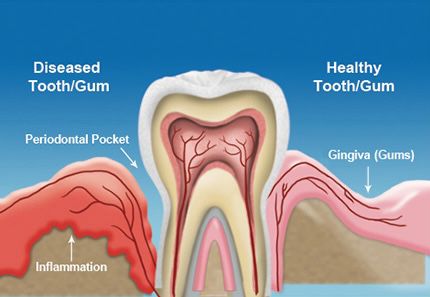While it is normal for young children to get loose (mobile) teeth, in adults, it can be a sign that you have a major problem. The most common cause for loose teeth in adults is gum disease and if you let this condition continue without treatment, the bone that holds the teeth in place will be eroded. Without this support, a tooth will become mobile.
Gum disease, however, is not the only cause of mobile teeth. There are several causes; here they are listed in relative order of frequency.
- Gum disease
- Localized infection or abscess. An underlying infection in the gum will make teeth lose.
- Trauma: If a tooth is knocked, then it may become loose for a few days. It may tighten up again by itself, depending on how severe a blow it receives. There is a risk of nerve damage and an abscess occurring later so it is best to get it checked out.
- Bite alignment
- Bruxism (grinding or clenching): Similarly to the bite problems mentioned above, the excessive forces from grinding or clenching your teeth can make them loose.
Even if you only have one loose tooth, there may be others that are heading the same way. If you have gum disease that you ignore, you may be looking at a lot of dental treatments, including extractions, dentures, or implants.
Missing teeth can have a significant impact not only on one’s appearance and self-confidence but also on the overall health of the mouth. When a tooth is missing, the other teeth have to take a lot more pressure which can lead to the decline of the health of the rest of the mouth. You also lose the ability to chew your food as normal which can force you to avoid certain foods that you enjoy.
Luckily there are treatments available for loose teeth. The treatment for a loose tooth does of course depend on the cause, so the first action to take is to get in contact with your dentist.
Gum disease is very common. Worldwide it is estimated that half the population has some degree of gum disease and most people will experience it at least once in their lives.
Gum disease is caused by a build-up of plaque on the teeth which is a sticky substance containing bacteria. Some of the bacteria are harmless, but some can be very harmful to the health of your gums.
It is very important to remove the plaque from your teeth by brushing them. If it is left, it will build upon your gums and cause them to become irritated and bleed.
If untreated, a condition called periodontitis can develop. This condition affects the tissues that support the teeth and hold them in place. Each year worldwide there are about six cases of severe periodontitis for every 100,000 people. Periodontitis can cause the bone in your jaw can recede and small spaces can open up between the gum and teeth which can harbor even more bacteria. Your teeth can in time become loose and may eventually fall out.
If your gums are inflamed, painful, or bleeding it is important to make an appointment to visit your dentist. They will thoroughly check your teeth and gums and prescribe you the best treatment for gum disease.
Nearly 1 in 3 adults suffer from a type of periodontal, or gum disease. It is now the leading cause of adult tooth loss worldwide. Initially, it is painless hence tends to be neglected until it has progressed to irreversible loss, but causes bad breath (80% of bad breath is caused by gases given off by bacteria that cause gum disease).
If it is allowed to progress, extensive bone loss can occur under the gums resulting in infections and loose teeth.
The Symptoms- Problems you may face are:
- Bad breath or a bad taste in your mouth
- Gums are red, puffy, swollen, or tender
- Gums bleed during brushing or flossing
- Teeth look longer because the gums have receded
- Changes the way your teeth fit together when you bite
- Teeth become loose
- Dental/Oral infections.
- Oral /Dental discomfort
- Sensitivity of teeth
- Toothache and swelling
The Treatment:
Professional cleaning above and below the gums by your dentist or hygienist is the only way to remove the plaque and tartar that has built up. If your condition is severe, we can carry out more advanced procedures here at the center to help restore health to your gums. This includes the use of specialized materials that can rebuild the bone lost by gum disease, helping you to keep your teeth for longer. Other modalities of treatment like gum surgeries, bone grafting to regain lost bone structure, Root canal treatment to contain tooth infection, and also splinting by various methods like joined crowns may also be used. Splinting helps reduce harmful tooth mobility which could be a self-propagator, so it distributes the load and protects the teeth.
Plaque is the primary cause of gum disease. However, other factors can contribute to periodontal disease. These include:
Hormonal changes, such as those occurring during pregnancy, puberty, menopause, and monthly menstruation, make gums more sensitive, which makes it easier for gingivitis to develop.
Illnesses may affect the condition of your gums. This includes diseases such as cancer or HIV that interfere with the immune system. Because diabetes affects the body’s ability to use blood sugar, patients with this disease are at higher risk of developing infections, including periodontal disease and cavities.
Medications can affect oral health because some lessen the flow of saliva, which has a protective effect on teeth and gums. Some drugs, such as the anticonvulsant medication Dilantin and the anti-angina drug Procardia, etc, can cause abnormal growth of gum tissue.
Bad habits such as smoking make it harder for gum tissue to repair itself.
Poor oral hygiene habits such as not brushing and flossing daily make it easier for gingivitis to develop.
Family history of dental disease can be a contributing factor for the development of gingivitis.

